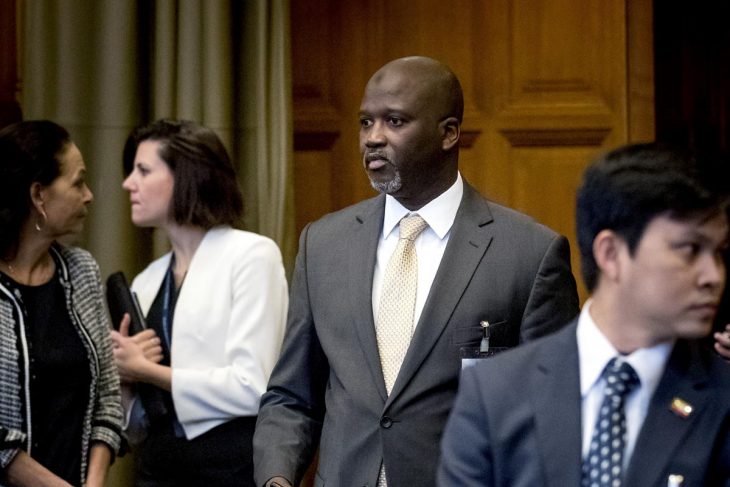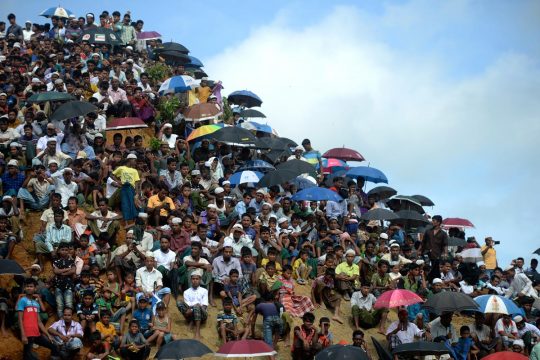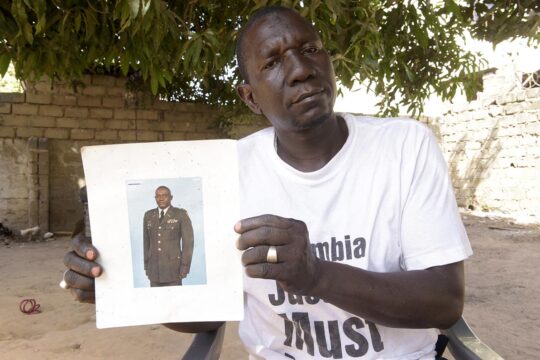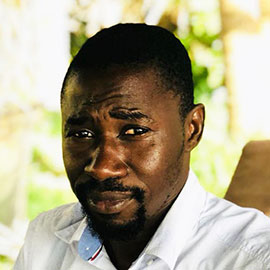For three and a half years, Gambia, a small West African country, has been in transition from dictatorship to democracy, and it has ticked a number of boxes. An impressive, crime-revealing, Truth, Reconciliation and Reparations Commission (TRRC) has been ongoing publicly since January 2019. Several bills, including amending the criminal code and code of criminal procedure, were put before lawmakers for enactment, as well as a new access to information law. A new constitution is being drafted.
The man in the government who has been key behind this and the leading voice on the rule of law and accountability is Abubakarr Tambadou, a former human rights lawyer who became Gambia’s Minister of Justice after the fall of Yahya Jammeh, the head of a rights-abusing 22-year dictatorship, in January 2017. Politically prominent and influential, Tambadou was also appointed the chair of the security sector reform committee early 2019. This put him in an even stronger position to drive the country’s transitional justice policy.
That was until June 25, when Tambadou announced his resignation.
“His departure could affect the transitional justice process”
Since his announcement, uncertainty appears to be hanging over the country's reforms and the question has been raised: will Gambia’s transition stay on course? The concern, said Gambia’s human rights lawyer and chairman of the National Human Rights Commission, Emmanuel Joof, is genuine. Joof is a longstanding friend of Tambadou. In the early 2000s, the two were part of Gambia’s “stubborn” lawyers, a coalition of human rights defenders who challenged rights violations under Jammeh. “We can all be lawyers but the passion of Tambadou, his dedication, was fairness and justice. Tambadou was never for impunity,” said Joof.
To many, Tambadou did not just establish the transitional justice process for the sake of it; he saw and lived an undesirable past that the so-called “new Gambia” must break from. Perhaps the most successful institution in this regard has been the TRRC. Tambadou was fully “supportive” and never attempted to interfere with the Commission’s work, said Dr Baba Galleh Jallow, the TRRC’s executive secretary. “He certainly knows the transitional justice process better than anyone in the government right now. So, yes, his departure could affect the transitional justice process, especially if his successor is not very strongly dedicated to it.”
“I have to say that we are concerned because we do not know what the future holds for us [victims] as far as justice and accountability issues are concerned,” said Sheriff Kijera, chairman of the Center for Victims of Human Rights Violations. “Tambadou’s resignation is quite shocking. We could not hide our frustration.”
A sensitive political context
Gambians are heading to the polls next year. Kijera is worried about the political influence and strength of the Alliance for Patriotic Reorientation and Construction (APRC), the party supporting former president Jammeh. (Jammeh is in exile in Equatorial Guinea.) “We have seen the current trend in the appointments – the hiring of the enablers of Yahya Jammeh – in key positions. We are concerned that the Executive might want to lobby for more political support from APRC sympathisers,” said Kijera. It might be around the time of the elections that the TRRC would come up with its final report and recommendations. Elections could therefore pose a special challenge to the implementation of the TRRC recommendations. For a reliable implementation policy, Kijera said, there would have to be a Justice Minister as passionate about the process as Tambadou manifested. “Will there be political will?” asked Dr Ismaila Ceesay, a government critic who now leads a political party called the Citizen Alliance.
Tambadou’s ‘lows’
Tambadou has arguably been the most criticized member of Gambia’s cabinet. And probably the most praised too. His critics point to several “injustices” in the country. Ceesay was a political science lecturer at the University of the Gambia at the beginning of 2018 (and still is). Back then he declared that the new president Adama Barrow would be responsible for the prolonged stay of the West African forces in the country because he was not showing trust in the army and had not visited a single military installation since his election victory in December 2016. Apparently, for the new, post-dictatorship government, this was incitement. Ceesay was picked up by the police. Arrests like Ceesay's were not uncommon, although a lot of them were seen as intimidation tactics since many cases were never taken to court. Several prominent Gambians like opposition leaders Mamma Kandeh, Fabakary Tombong Jatta and rights activists like Madi Jobarteh were arrested in manners that were reminiscent of Yahya Jammeh’s era.
In June 2018, three young men protesting against “destructive” mining activity in Fabara, a settlement about an hour drive from Banjul, were shot and killed. Several others sustained gunshot injury. Though the state investigated the incident, no one to date has been prosecuted and compensation recommended to the affected families remains unimplemented. “Tambadou was here when I was arrested. He was around when other people were arrested. He was there when security forces shot and killed people in this country. What did he do? Nothing,” Ceesay stated.
Today, however, Ceesay seems to wish Tambadou had not quit. “This is a critical time for the transitional justice process. It seems as if the whole thing is crumbling – we started seeing those signs,” he said. “So, why is he jumping ship? For me, he should have, as someone who believed in the whole transitional justice process and as a patriotic citizen, overseen it to its conclusion,” Ceesay now lamented. “We know he has done a very good job. If this [transitional justice process] fails, it might be because the person replacing him might not have the same clout, institutional memory and passion.”
A strong stand on Jammeh’s prosecution
As Minister of Justice, Tambadou took a firm stance on accountability for Jammeh-era crimes. In January 2020, at a gathering in Banjul where president Adama Barrow was seated, Tambadou declared: “If former President Yahya Jammeh ever comes back to this country, he will face immediate arrest and charges of the most serious kind and no amount of irresponsible idle talk or political brinkmanship will prevent this from happening.”
Such tough statements have been quite unique in the Barrow administration. They are in contrast to the President’s more ambiguous moves. Barrow has been criticized for flirting with the support base of Jammeh since he fell out with the United Democratic Party. His rhetoric has changed from accountability to “we have a nation to build” and “we put the past behind us” – statements generally seen as attempts to create a soft landing for Jammeh. In 2019, Barrow told a rally in Foni, Jammeh’s region, that the former authoritarian leader cannot rule the country again but he can return home as an ex-president. This aroused huge criticisms from opponents.
And this made Tambadou an ally to Jammeh’s victims.
“I am aware that my principled position on former President Jammeh has not endeared me to his supporters and sympathisers, and to them I say: Jammeh belongs to the past, so wake up from your dreams of a Jammeh political comeback and move on with your lives,” Tambadou told journalists at a his farewell press conference on June 25. At the event, Tambadou – who will be taking a position as Registrar of the United Nations International Residual Mechanism for Criminal Tribunals – also said he does not know if he should “commiserate” with his successor Dawda Jallow, or congratulate him. He comes to a hot seat, said the outgoing cabinet member.
Questions on the new Minister of Justice
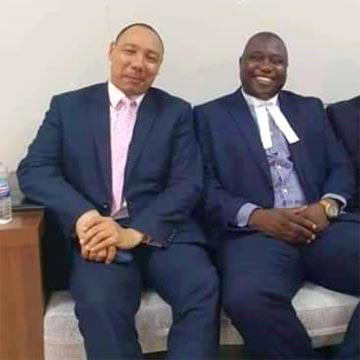
The new Minister of Justice is a former teacher and civic educator who graduated from law school in 2010 and took the Bar in 2011-2012. He has a Masters in human rights from the University of Essex, United Kingdom. Following his appointment in government, Dawda Jalloh’s resume has become a matter of public interest. Both at the law school and at the Bar, Jallow was a batch mate of Edward Singhatey, a prominent member of the Jammeh-led military junta that took power on July 22, 1994, through a military coup. Another former batch mate of Jallow, who does not wish to be named, described Jallow’s relationship with Singhatey as “too close”. This relationship may come to be tested when and if the TRRC recommends Singhatey for prosecution. “Jallow is a very obedient person who has come to follow the President’s path,” alleged a former lecturer of Jallow, who also wished to remain anonymous.
At his swearing-in ceremony at the State House, Jallow assured “all stakeholders in the transitional justice process, especially the victims, that the Ministry of Justice will continue to support and provide the necessary leadership to ensure that the transitional justice process reaches its logical conclusion.” (Jallow declined to be interviewed for this article.) Junkung Jobarteh, a former magistrate and schoolmate of Jallow, said Jallow has the capacity and intelligence to do the job. Almamy Taal, Jallow’s former lecturer at the law school, confirmed that “he was an excellent student, he came to the law as a mature person and comported himself well.”
“An honest man, smart, open and critical minded”
As a magistrate, Jallow did make rulings that went against the state, despite the interest of the Jammeh government in those cases. In 2014, a local online newspaper critical of Jammeh, Kairo News, ran the following headline: “The admirable magistrate Dawda Jallow”. The newspaper praised Jallow for acquitting a former permanent secretary at the Youth Ministry on false information charges.
“I recall the days when Dawda Jallow was the head of programs at the NCCE [National Council for Civic Education], where he had traversed the length and breadth of the country educating citizens about their civic rights and duties,” said Madi Jobarteh, a leading Gambian rights activist. “Dawda was a constant face and voice on the airwaves on television and radio. I used to know Dawda as an honest man, smart, open and critical minded. With this hindsight I am elated that he is now the Minister of Justice,” Jobarteh said. (On 30 June, Jobarteh was himself charged with false information and broadcasting.)
Key players like Dr Baba Galleh Jallow of the TRRC and Emmanuel Joof of the Human Rights Commission stand clear that the country’s transitional justice process would not be knocked off-course without a fight. “I do not have these fears at all,” said Jallow. “Yes, it is possible that whatever government is in place at the time will try not to follow through with the TRRC recommendations. But I believe that Gambians would then be prepared to make sure that does not happen. I’m hoping there won’t be any need for that.” Joof shows similar faith. “None of us will condone impunity. And I think you have seen how people can be emboldened when those who committed atrocities walk free."
TRRC HOSTS THIRD RECONCILIATION SESSION
Nearly two decades after torturing political detainees at a military encampment in Fajara, near Gambia’s capital city Banjul, Major Babucarr Bah apologized to his victim at an event organized by the country’s Truth, Reconciliation and Reparations Commission (TRRC).
In 1994, Bah tortured Omar Jallow, a prominent Gambian politician and Agriculture minister under the toppled civilian government who was arrested by the new military junta, alongside others, and illegally kept at the barracks. In February 2019, Jallow gave a chilling account at the TRRC of how Major Bah continuously tortured him during his detention. On that same month, Bah confessed to the Commission to torturing Jallow.
On July 1, Bah apologized to the veteran politician at an event organized by the TRRC at the request of perpetrators.
This is the third reconciliation event held by the TRRC. The first event brought former military leaders Sanna Sabally and Edward Singhatey together in 2019. The second was a reconciliation meeting in a village called Jumbur, about an hour drive from Banjul, that was severely affected by a witch hunting campaign of the former ruler Yahya Jammeh.
The July 1 event brought together a few people who had a bitter past within the country’s prison system. Malang Tamba, a confessed torturer, apologized to Lamin Jah and Soriba Conde, two prison wardens he tortured. Conde himself apologized to the former chief of the Gambian police Ensa Badgie against whom he gave false testimony in court in 2013. (Conde, a former armed robber, had then claimed that Badgie was supporting their robberies for personal gain.) Another perpetrator, Ebrima Jammeh, also apologized to Jah and Conde and the prison wardens he tortured during his time in Mile 2 prison.
“As Gambians we have to learn to forgive and forget," said Imam Ousainou Jallow, head of the Truth Commission’s reconciliation committee, after the July 1 session.


